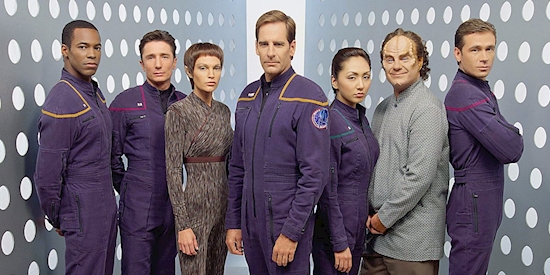Why Star Trek: Enterprise's Series Finale Is So Hated by Fans
Fifteen years ago this month, Star Trek: Enterprise ended its four-season run on UPN, concluding the adventures of Captain Jonathan Archer onboard the U.S.S. Enterprise NX-01. The prequel series to the entire Star Trek franchise had divided fans ever since its premiere in 2001 as it explored the early days of humanity's first forays into deep space, powered by the warp drive starships just prior to the official founding of the United Federation of Planets. However, there is one aspect of the series that the franchise's fanbase all appears to agree on: The 2005 finale is widely regarded as the worst series ending of any of the franchise's numerous television series.
Click the button below to start this article in quick view. Start nowEnterprise's head-scratching finale, titled "These Are the Voyages...," isn't told from the perspective of the show's main cast but instead from that of Star Trek: The Next Generation character Will Riker during the events of the previous series' seventh and final season. Facing a moral crisis within the Federation, Riker and Deanna Troi go to the holodeck on Enterprise NC-1701-D to seek guidance from history. The two revisit the events surrounding the decommissioning of Enterprise NX-01 and the signing of the Federation charter more than two centuries earlier (and approximately six years after the events Star Trek: Enterprise's penultimate episode, "Terra Firma").
As Riker and Troi observe different points across Enterprise NX-01's final mission, Archer is faced with the high-pressure task of delivering a keynote speech as the Federation charter is about to be ratified as his command of Enterprise coming to an end. However, during a mission into deep space to rescue the kidnapped daughter of an Andorian dignitary, chief engineer Trip Tucker sacrifices himself to save Archer's life. Watching a grief-stricken Archer find the strength to return home and deliver his speech, Riker finds his own resolve to lay his Starfleet on the line.
Even before the episode first aired in May 2005, cast members expressed their misgivings about the finale being repurposed into what felt like an interlude episode of The Next Generation. Star Jolene Blalock went so as far as to refer to the decision as "appalling." Contemporary professional critics were similarly puzzled by the creative choice to frame the episode within the context of The Next Generation. While guest star Jonathan Frakes was initially eager to reprise his role as Riker, he later criticized the decision to include him in the finale. Recalling that, outside of working again alongside longtime costar Marina Sirtis as Troi, the production had been an awkward affair, years later Frakes deemed the whole situation "an unpleasant experience" and a disservice to the cast and fans.
Fans were also vocally displeased by the death of Trip in the episode, with many feeling that the character's death felt forced and a cheap shock to engage the audience than a deserved, emotional payoff in effective service to the story. Actor Connor Trinneer would note months later the cast felt "hurt" by the nature of the series conclusion but enjoyed working with Frakes and Sirtis. Trinneer elaborated that while he felt his character had gotten out of worse predicaments over the course of the series and the choice to kill him off felt arbitrary, it did succeed in getting audiences talking about the episode overall.
While the finale's initial broadcast was watched by 3.8 million viewers, the series' largest audience since the previous season, the backlash was so considerable that producers held a press conference to address complaints and to defend their decisions. The producers noted that the finale was intended to be a swan song for the franchise as a whole, as the final planned episode of Star Trek on television since the debut of Star Trek: The Next Generation in 1987. As the end of an 18-year run on UPN, the producers had planned the finale to reflect the end of an era, not just of Enterprise's four seasons. In response, actor Anthony Montgomery claimed there would've have been a more effective way to close out the series and the franchise while properly honoring both.
More than a decade since Star Trek: Enterprise's last bow, the television rights to the series reverted to CBS, leading to the launch of a new wave of Star Trek television programming, with Star Trek: Discovery and Star Trek: Picard leading the charge. While Discovery was initially set decades after the events of Enterprise, its connections to the earlier prequel series and its controversial finale have been downplayed as it forges its own path. And, as the franchise continues to grow with new programming for the next generation of fans, perhaps it's for the best that the Enterprise finale is best left forgotten as boldly goes forward.
Source: www.cbr.com

